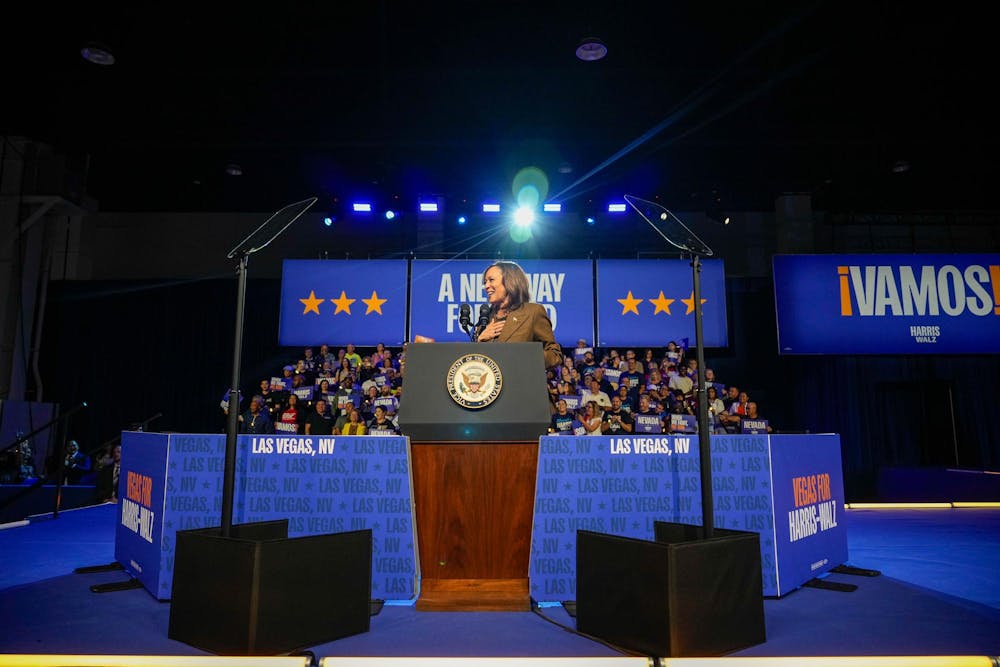When voters first got a look at Kamala Harris during the 2020 Democratic Party presidential primaries, they saw a person with heavily left-leaning views wanting to implement liberal policies. Four years later, Harris is now stating she wants to build the border wall, something most did not have on their election bingo cards.
But the policy change is nothing new for the vice president, as she has shifted most of her positions since beginning her 2024 presidential campaign.
This is in sharp contrast to her 2019 platform, which championed decriminalizing border crossings, Medicare for All, gun buyback programs and banning fracking.
The “180,” as some have called it, has left the public wondering what she believes in.
Political science experts suggest that voters’ opinions influenced her stances.
According to ASU Political Science Instructor Mark Simpson, those who vote in primaries tend to lean towards the extremes of their party, while general election voters are often closer to the center.
This explains why Harris has moved away from her more liberal voting base to the center for this year’s general election.
But her supposed “flip-flop” is more complicated than it seems at face value.
Simpson said that she used the same strategy in the 2020 primary, moving left to gain favor with far-left voters.
Competing against candidates like Elizabeth Warren and Bernie Sanders could have also pushed Harris to take more left-leaning stances.
“You sometimes have to adopt that sort of stance to outdo your opponents, and it obviously didn't work for her,” Simpson said.
Even in 2019, the authenticity of Harris’ claims was questioned by democrats and republicans alike, mostly due to her reputation as “top cop” when she was a district attorney and later attorney general of California.
“Harris is really trying to emphasize that tough role she took as a prosecutor and trying to make it clear she's going back to positions that she's held all along,” Simpson said.
Despite the criticism of her current and previous position shifts, her actions are more than common for a presidential candidate.
Dr. Kim Fridkin, a foundation professor of political science at ASU, said, “What Harris is doing is pretty typical—it might seem extreme since her campaign is much shorter than the typical presidential campaign.”
However common, Harris’ abandonment of leftist policies could cost her the November election.
“The bigger concern for her would be that they [far-left voters] would say, ‘Well, she's not all that different from a Republican, we're just not going to go and vote.’ She has to be careful not to moderate her policy stances so much so that some far-left voters are no longer excited to go cast a ballot for her,” said Simpson.
But to some on the left, the damage is already done. Josh Bennett, a regional finance officer for the Revolutionary Communists of America, said that any support of far-left stances now would be insincere.
According to Bennett, Harris has made it clear that “[she] will do nothing to… court young or even mildly progressive voters because [her] real voting constituency is the elite and wealthy.”
Though the loss of far-left voters is a real possibility, Simpson and Fridkin agree the move to the center was smart.
If Harris ran on her 2020 platform, “she would be handing the election to Trump. It would just be a nonstarter for her,” Simpson said.
As for if her views will continue to change during her potential future presidency, most are unconcerned.
Dhruv Rebba, Arizona co-lead of South Asians for Harris and a delegate at the 2024 Democratic National Convention, said, “I'm pretty confident that she's gonna govern on the policies that she promised the American people because that's what we would elect her to do. It's expected of her.”
Indeed, Fridkin agreed that Harris is unlikely to change her policies if she wins, especially if she seeks reelection.
Of course, voters have varying perspectives on the significance of her shifting positions, with some supporters of Harris viewing the changes not as superficial, but rather as a willingness to listen.
“That's what we expect of our elected officials. We want them to be receptive to voter concerns… She was willing to learn new perspectives,” said Rebba.
But others see it as a way to gain and maintain power.
Bennett said, “[she is] a career politician… Any so-called shifts that she has made in regards to policy is simply the shifting that is required of her to be the favored candidate of the ruling class.”
Like peering through the faces of a diamond, different angles lead people to see politics in different ways.
Simpson put it best when saying, “Politics and elections are all about perception.”

